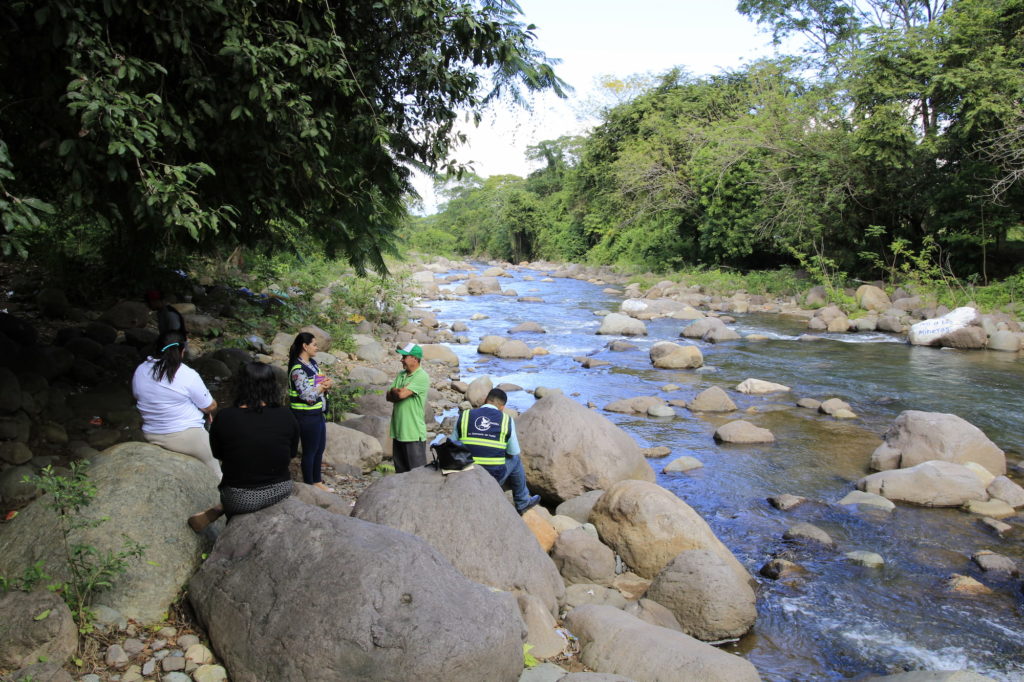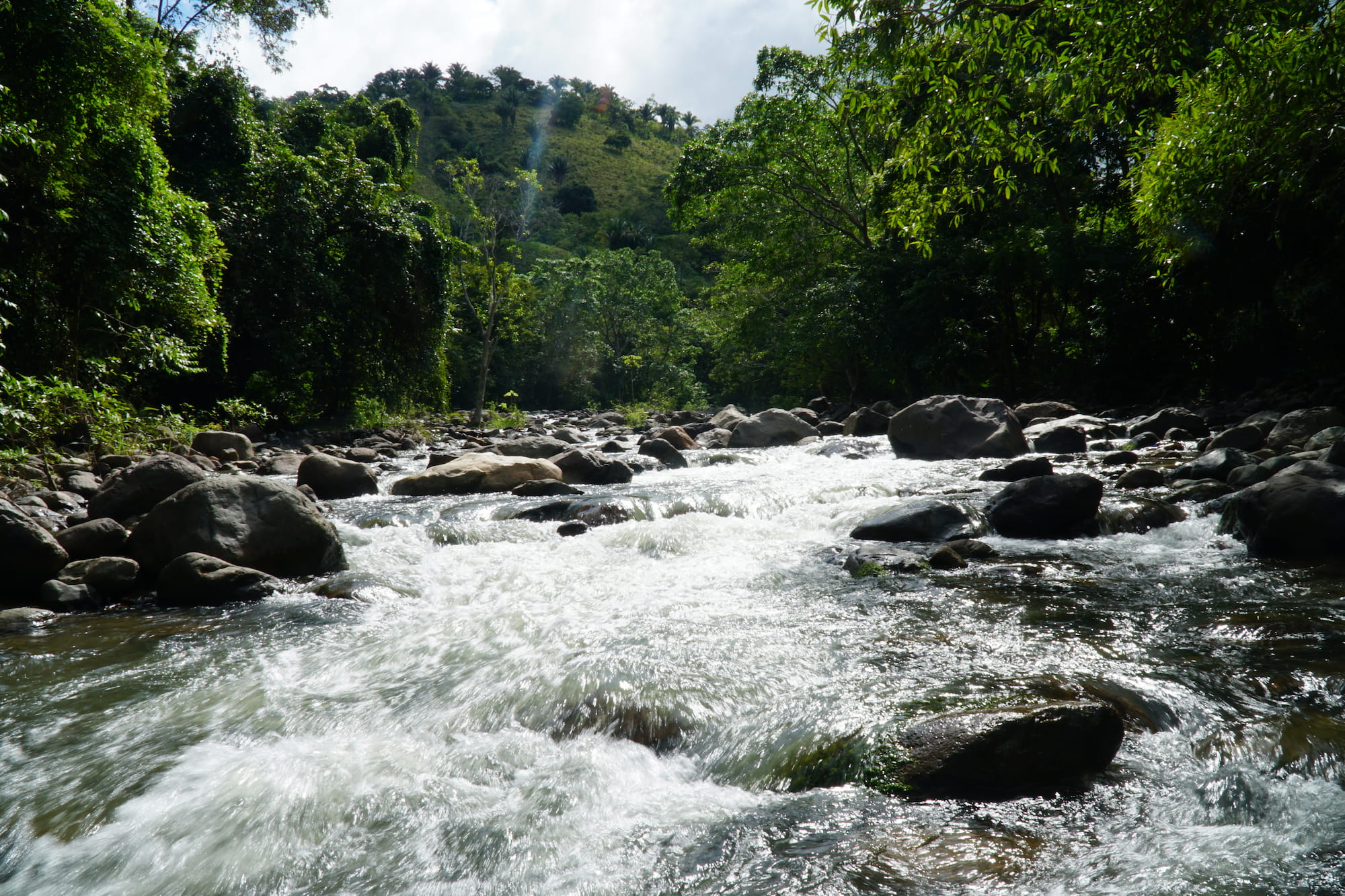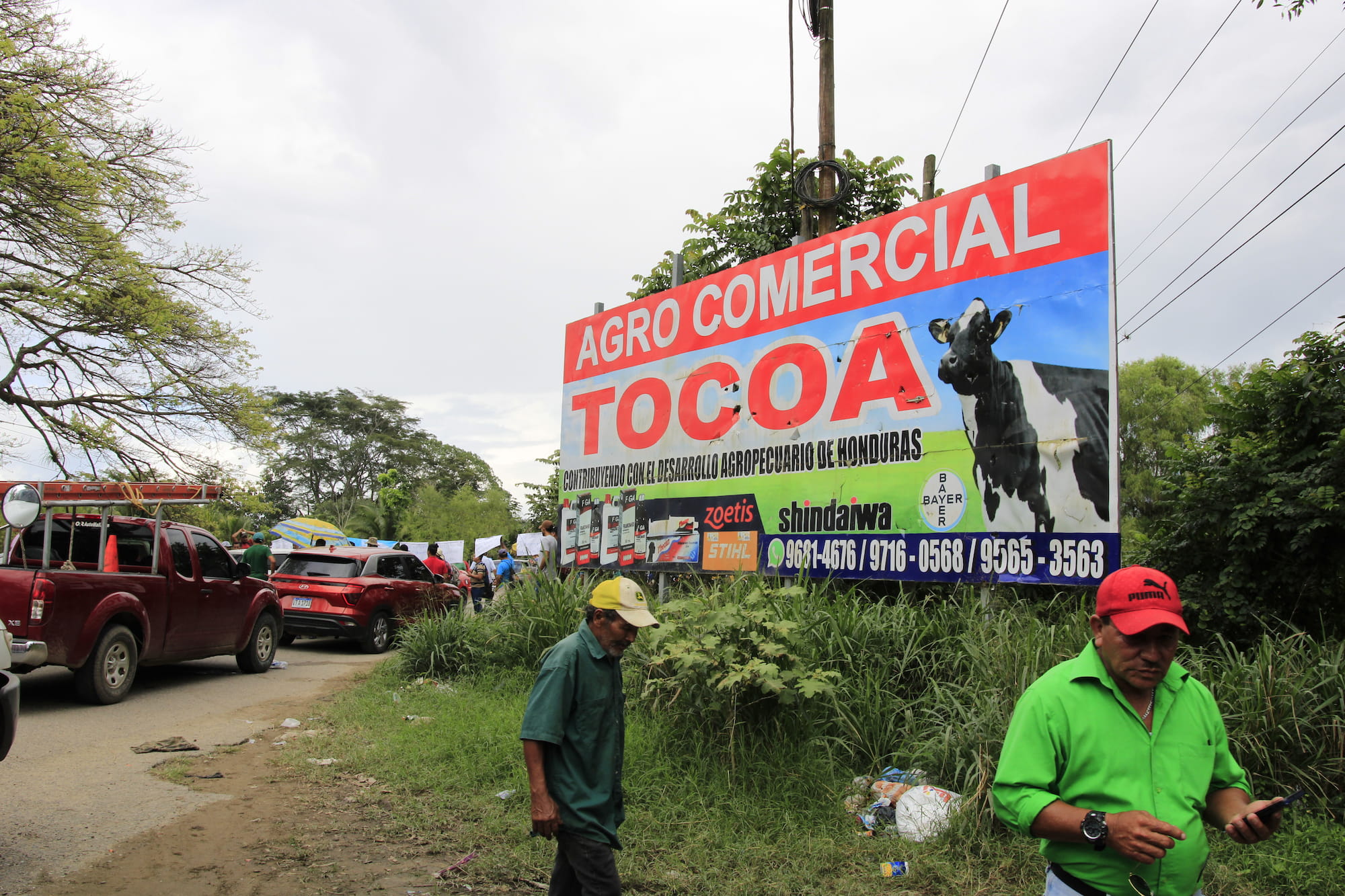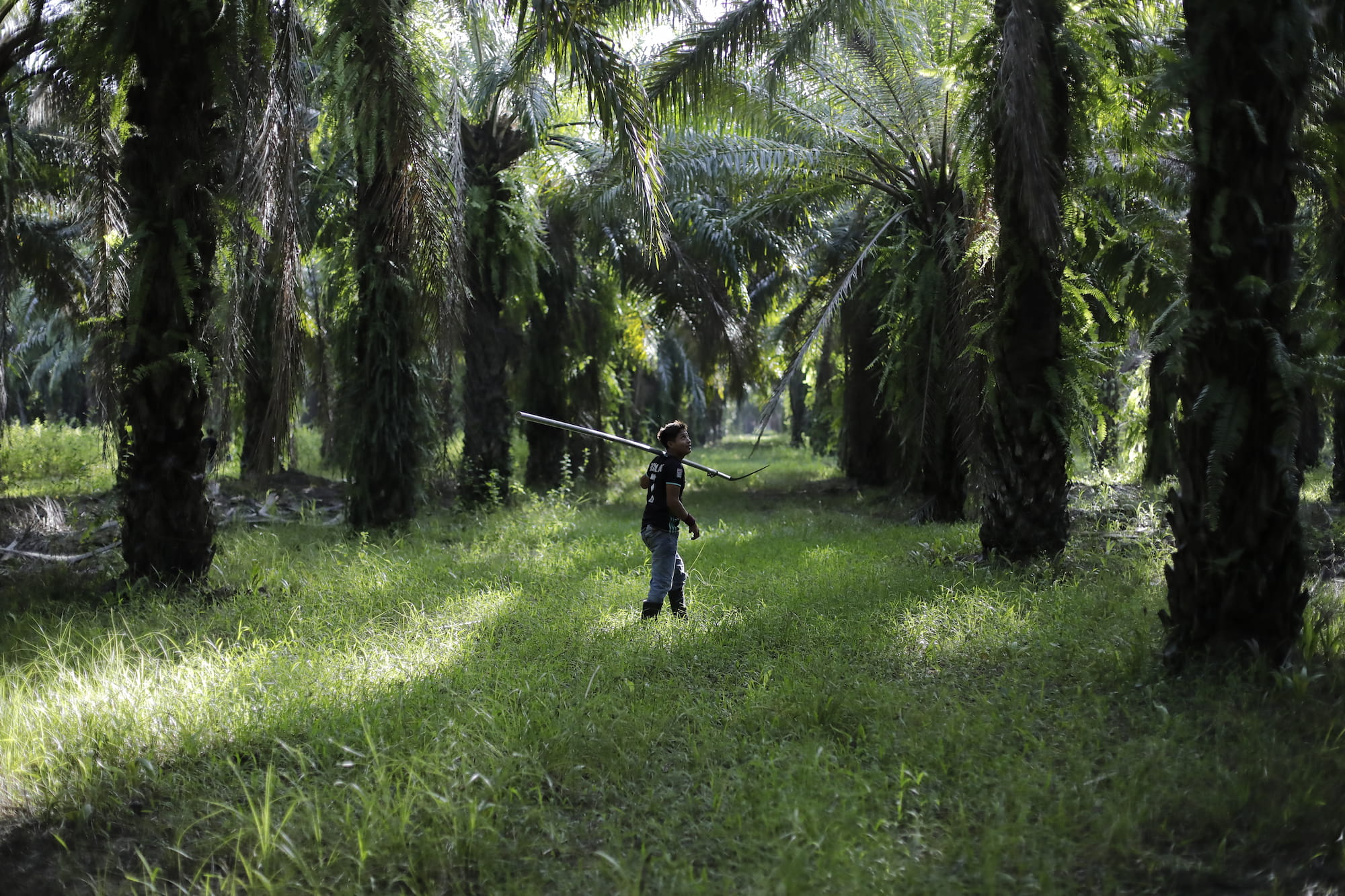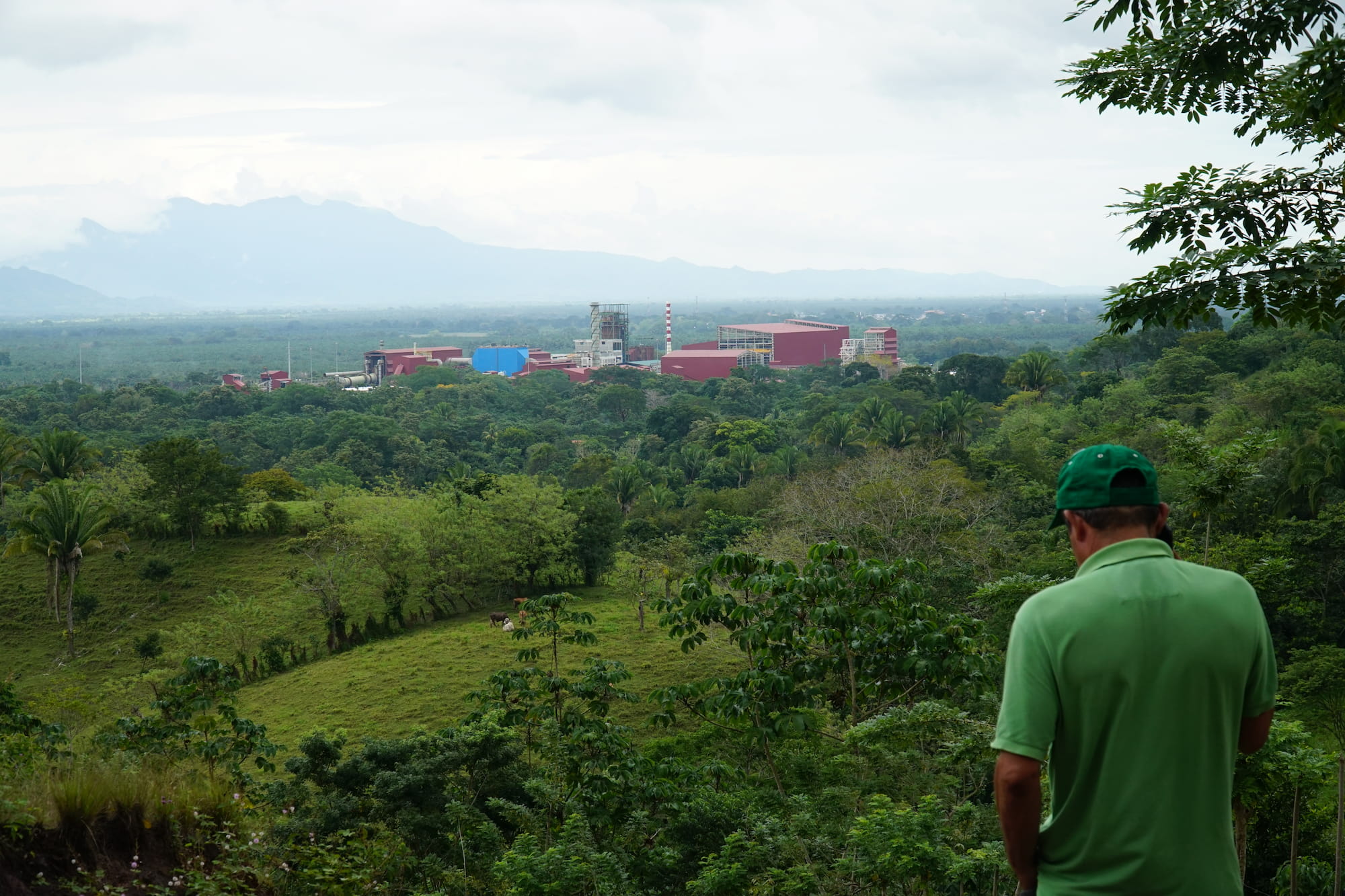On 7 January 2023, passengers on a bus traveling between Guapinol and Concepción witnessed a shocking scene: two men lay dead beside a motorcycle while the engine ran. Upon recognizing the deceased, those onboard sent the news back home. The two men, Alí Domínguez (35) and Jairo Bonilla (28), were both water protectors from the community of Guapinol.
This article was translated in a collaboration with the Latin American Bureau (LAB), an online and in-print publisher and web-platform dedicated to amplifying independent journalism from Latin American.
By Allan Bu
Translated by: Leon Elliot from LAB
Photo: Amílcar Izaguirre y Jorge Cabrera
Their deaths have intensified the ongoing conflict between the community of Guapinol and the Inversiones Los Pinares company. Since 2017 the company has carried out mining activities in the Carlos Escaleras National Park resulting in the pollution of the Guapinol River.
Alí and Jairo were out collecting bills for a cable and internet services company when the motorcycle they were riding was intercepted. The identities of the people who stopped them remain unknown.
Like most people in the village of Guapinol, Alí and Jairo were committed to the defence of their river. Neighbours and friends remember them as kind young men, and active servants of the community. Both were fathers of young children.
10 days after their murders, on 17 January 2023, peasant leader Omar Cruz Tomé, and his father-in-law, Andy Martínez, were assassinated in the Adán Fúnez neighbourhood of Tocoa.
The four deaths heightened tensions in Colón and reignited the longstanding conflict between peasants and landowners. With neither side yielding, and state intervention practically non-existent, there is no resolution in sight.
Colón is one of the most prominent drug corridors in Honduras and home to Los Cachiros, a criminal organization that, at its peak, was responsible for 90 per cent of Honduran drug trafficking. The impact of illegal activities has been particularly pronounced in villages inhabited by the Garifuna people, many of whom have seen their land dispossessed by criminal groups, adding fuel to the ongoing conflict.
Guapinol is a semi-rural community located in the Bajo Aguán region, 10 minutes outside of Tocoa, Colón’s main city. In 2017, villagers noticed a reddish hue in the river where they traditionally fished and bathed.
Realising it had become polluted, members of the Guapinol community quickly turned their attention towards Inversiones Los Pinares, the company responsible for mining activity in the Carlos Escaleras National Park (also known as Montaña de Botaderos). Villagers set up camp on the road accessing the mining concession zone and remained there, in protest, for 88 days before they were violently evicted. The protest was quickly suppressed and its leaders were criminally prosecuted, making this the latest in a series of major conflicts in Bajo Aguán. Of the 32 people charged by the Public Ministry of Tocoa, 12 were released after 14 days in initial detention, whilst eight were imprisoned for 914 days (two years and five months).
Walking through the streets of his village, Reynaldo Dominguez, one of the leaders of Guapinol’s environmental struggle, recalls the names of at least 10 friends who have lost their lives in defence of the community’s waterways. However, he has lost more than just friends: Alí Magdaleno Domínguez Ramos, a recent victim, was his younger brother.
Alí was responsible for managing security during protests organized by the Environmental Committee of the Community of Guapinol (Comité de Ambiente de Guapinol) who, together with Jairo Bonilla Ayala, formed part of a group responsible for spotting infiltrators sent to disturb their protests.
Guapinol’s struggle against mining operations in the region began during the second term of former president Juan Orlando Hernandez, who currently awaits trial in New York for drug trafficking charges in the United States. In the first year of Xiomara Castro’s presidency both the mining operations and the protests against them continued; but, as of January 2023, there had been no more violent incidents against environmental defenders.
However, the threat of fresh violence is always lurking, says Reynaldo Dominguez. ‘It’s been hidden, waiting for the right moment to re-emerge, and it has its objectives: to hit us where it hurts the most. The use of violence serves a purpose and isn’t going to go away, it will show its claws when the moment is right,’ he says.
Despite striking such fear in the Guapinol community, the murders of Jairo and Alí will never affect their resistance, Dominquez maintains: ‘We are not going to back down or give up this struggle. These two young men sowed a seed, inspiring others to serve the community.’
According to the spokesperson for the National Police in Colón, Adamín Rodríguez, the crime was initially investigated as a robbery: ‘They were collecting payments for a cable company at the time. The Police are working to clarify specific events, but we already have some information: suspects have already been identified, and we are in the process of obtaining arrest warrants for the individuals responsible for committing the crime,’ Rodríguez told Contracorriente. Families and friends of the victims reject this, maintaining premeditated murder. ‘This was planned,’ asserted Dominguez, ‘because no thief would carry out a murder like this, executed with two shots to the head.’ That the deceased were left with their belongings intact serves as further evidence to support their hypothesis. This included money they had collected that day, which was subsequently returned to their employers, and Jairo Bonilla’s motorcycle, which was left at the scene of the crime.
‘We demand that the State investigates these crimes with urgency, and that it shuts down these mining projects once and for all, so that we can return to the peace we had before 2017,’ Dominguez pleaded.
The state and the crime
The state has been responsible for various failings in the Bajo Aguán region. Environmental defenders in Guapinol assert that Inversiones Los Pinares obtained their operating permits illegally and without consulting the affected communities. The defenders argue that Inversiones Los Pinares produced evidence from a falsified open assembly in which they alleged that local communities gave approval for the project. Since 2017, 20 environmental defenders from Guapinol have been imprisoned by state forces, whilst various crimes against protestors in El Aguán remain to be investigated.
Environmental defenders in Guapinol assert that Inversiones Los Pinares obtained their operating permits illegally and without consulting the affected communities.
Almost 200 environmental defenders have been murdered since the ousting of President Manuel Zelaya Rosales in the 2009 coup d’état, according to Esly Banegas, President of the Coordination of Popular Organisations of Aguán (Coordinadora de Organizaciones Populares del Aguán – COPA). ‘There is a list in the hands of the Inter-American Commission on Human Rights of around 120 cases where there has been no investigation and the perpetrators have acted in impunity,’ said Banegas, who lost her own son to the violence back in 2016. At the time she was a pre-candidate in the Tocoa mayoral elections, representing the political party Libre (Libertad y Refundación).
Alí and Jairo were environmental defenders, and identified as such, but the National Police continually deny any link between their murders and the struggle for environmental justice in Guapinol: ‘No, it has nothing to do with it. These were guys from Tocoa who were collecting payments for a cable company when they were robbed and murdered. It was the result of a common crime and has nothing to do with the environmental part. There are already people who have been identified, but we will not mention any names so as not to hinder the investigations,’ announced police spokesperson Adamín Rodríguez.
The police official acknowledged that ‘people had been arrested’ in relation to violence against environmental defenders previously, but affirmed that ‘many months’ had passed since the last incident of this sort in Colón.
Esly Banegas disagrees, arguing that there have been active efforts to suppress reports of violence by both the police and the army, ‘at the whim of agribusiness in the area.’ She continued: ‘In this valley, from our perspective, the murders have everything to do with the defence of our water rights. There’s no other answer to everything that’s happening, yet there’s no willingness to conduct any sort of investigation, as should be done, which could reveal the truth.’
Questions have also been raised over the nature of the official investigation into Alí and Jairo’s murder. Not only did the police fail to transport the bodies of the deceased to the Public Ministry, leaving the family to do so themselves, but the formal identification of their bodies was carried out in their homes, by an attorney previously responsible for prosecuting 32 water defenders – one of whom was Alí.
The majority of state representatives in Tocoa remain silent in the face of the ongoing conflict. Upon requesting an interview with representatives at the Public Ministry, Contracorriente was met by a security guard with one official message to relay: no one is going to talk to you. On a small piece of paper, he jotted down the name of the Ministry’s spokesperson and the telephone number for their office in La Ceiba which, in the end, proved to be incorrect.
Eventually however, we were able to make contact with the Public Relations team for the Regional Prosecutor’s Office of Bajo Aguán, located in La Ceiba. When we asked about the progress of the investigations into the latest violent deaths, staff responded with the assurance that the cases were being investigated by the Police Investigation Directorate (Dirección Policial de Investigaciones – DPI), and the hope that those responsible would be taken into custody soon. The mayor of Tocoa, Adan Fúnez, did not respond to our request for an interview.
The National Human Rights Institution (Comisionado Nacional de Derechos Humanos – CONADEH) has begun its own investigation into the environmentalists’ deaths, according to its coordinator, Janeth Lara. ‘We have already approached authorities such as the DPI, the National Police, and the Public Prosecutor’s Office, as well as family members and people from the community,’ she confirmed, noting that they were currently awaiting results from a specialist investigative team. The latter has been gathering further evidence by exhuming the bodies of the deceased.
Further violence
Fear has heightened amongst social activists and human rights defenders in Colón since the beginning of 2023. Just 11 days after the killing of Alí Domínguez and Jairo Bonilla, the leader of the Colón Agrarian Platform (Plataforma Agraria de Colón), Omar Cruz Tomé, and his father-in-law, Andy Martínez Murillo, were also murdered. Cruz, who was also president of the Los Laureles Cooperative (Cooperativa Los Laureles), was shot and killed by assassins, in his home, in 12 blows. He should have been protected, but he was not, thanks to the insufficiency of the National Protection Mechanism – a system that has failed to protect environmentalists time after time.
The cooperative he governs, covering 565 hectares and comprising 60 families, occupies an area of land that was previously in the hands of the Dinant Corporation, owned by the Facussé family. The Facussés have been at the centre of two major conflicts in Bajo Aguán, and Ana, the daughter of the late Miguel Facussé Barjum, currently owns Inversiones Los Pinares together with her partner Lenir Pérez.
No conflict in the Aguán valley is without nuance.
No conflict in the Aguán valley is without nuance. For months now, farm workers for the Dinant Corporation have taken to the streets, protesting job losses triggered by the seizure of land by peasant groups. ‘We demand that those who have encroached on Dinant’s farms are evicted,’ asserted Noemí Antúnez, one of the protesters who has occupied the CA-13 highway connecting Tocoa with La Ceiba.
‘We are poor people who work in the fields, and that is why we are here, expressing our concern because we are unemployed,’ she stated. Up to 1,400 jobs are at risk of being lost due to the intrusion of peasant groups, who she believes have been sent from other regions in an attempt to seize the land.
This protest by Dinant workers took place a matter of days before Omar’s death. A public letter issued by the law firm Bufete Estudios para la Dignidad states that, back in October 2022, Omar denounced the ‘existence of a plan by agribusiness companies in the area to assassinate the main leaders in Aguán.’ He had also recently attended a meeting with the security secretariat, where he asked the military and police in Colón to protect environmental defenders from potential harm.
The letter states that on 11 January 2023, Omar and representatives from the Agrarian Platform and law firm, Bufete de Estudios para la Dignidad, filed a complaint with the Public Prosecutor’s Office. In it, they accused Miguel Mauricio de la Soledad Facussé of being an accomplice to Los Cachos, a criminal organization which actively suppresses the rights of peasant farmers in the Aguán valley.
Advocating for environmental and land defenders in the Aguán valley, Bufete de Estudios para la Dignidad held a conference to publicly condemn the murder of Cruz Tome. Yoni Rivas, spokesperson for the Agrarian Platform in the Aguán Valley (Plataforma Agraria en el Valle de Aguán), expressed his concern over the fresh wave of violence unleashed in the region. ‘For months we have been warning of a plan to assassinate key leaders, and this plan included our colleague, Omar. On 11 January, members of another cooperative were shot at in the presence of the National Police, yet nothing was done to protect these people from harm’s way. We are concerned by what we are experiencing,’ he said.
‘Almost a year after an agreement was signed with the government on 22 February 2022, all we have experienced since then is more threats, and a total attempt to sabotage that agreement,’ added Esly Banegas. ‘The president does not want to listen to us’, she declared, frustrated by the central government’s disregard.
Victor Fernandez, director of Bufete de Estudios para la Dignidad, has urged human rights officials within the current government to challenge the administration. ‘They cannot remain silent in the face of inaction by the police and the complicity of the military,’ he said, noting cases that their organization has dealt with where members of the National Police had attacked peasant families.
Fernandez’s remarks were heard by the Minister of Human Rights, Natalia Roque, who shared an official statement expressing ‘profound indignation and pain’ over the murder of the two men. This was the second emergency statement they had made in less than two weeks, she implored, on the verge of tears, referring to the deaths of Alí Dominguez and Jairo Bonilla.
In their statement, the Human Rights Secretariat acknowledged that existing protection measures ‘have been insufficient and have frequently failed’ to defend environmental defenders and social activists. They continued by calling on the Security Secretariat ‘to fulfil its constitutional mandate by providing protection to human rights defenders who have received threats and attacks, especially in areas of territorial conflict.’
Victor Fernandez, director of Bufete de Estudios para la Dignidad, recognised that the peasant farmers had been ‘subject to a ferocious attack, aimed to demobilize,’ but urged them not to relent in their struggle. ‘We have become a real threat to the corrupt and violent economic power. Now, in the midst of all of this pain, is not the time [to give up],’ he declared.
Fernandez also had a message for President Xiomara Castro: ‘Who controls El Aguán, Mrs. President? Are you in charge, or has crime taken control? Today, crime is in charge. You are in control of the Army and the Police – the Army has the best intelligence agency in the country. Make sure that justice is served. The lands of El Aguán, by mandate of the State, belong to the reformed sector, not to the agro-industrial sector.’
The reformed sector refers to the peasant cooperatives who collectively manage large areas of land in the Aguán valley, a result of agrarian reforms introduced by the government. The purchase and occupation of this land by wealthy landowners such as Facussé has been at the centre of conflict in the region.
A few kilometers from Guapinol, 13 communities are defending another river. Similarly affected by the Inversiones Los Pinares mining project, The San Pedro River also originates in the Carlos Escalares national park. When their community noticed a brown hue in the water of the San Pedro just over a year ago, Santos Hernández and others from the village of Las Mangas began to protest.
Hernández is one of the 32 water defenders who has been prosecuted by the Public Ministry of Tocoa; reaching him for an interview was no straightforward task. In Las Mangas, like in Guapinol and the other communities engaged in the conflict, the mere presence of an outsider is enough to put locals on alert. However, when we finally entered his house, Hernández spoke to us openly and candidly about the ongoing struggle.
‘This isn’t an easy conflict, because they [Inversiones Los Pinares] are a very powerful company, and the authorities have allowed them to operate here. That’s the biggest difficulty we’ve faced. The government has been on their side,’ claimed Hernández.
‘The company is operating in a protected area that, for us, represents the lungs of Tocoa. The authorities know this, but have taken the side of the company. It’s regrettable and I condemn it. They aren’t serving the local population, only personal interests,’ he continued.
Hernández explains that the community has filed formal complaints to various bodies, including the Ministry of the Environment, the Honduran Institute of Geology, and Mines (Mi Ambiente y el Instituto Hondureño de Geología y Minas – INHGEOMIN). However, they have been left dissatisfied by authorities paying lip service to the community in their visits to Las Mangas. ‘Nothing seems to get done afterwards’, he laments. ‘Commissions visit, but they don’t help much at all, to be honest.’
Santos Hernández, who was imprisoned for 14 days, is also concerned that there is ‘an agreement between the company and the authorities’ to press legal action against those opposing the mining activities of Inversiones Los Pinares. ‘I still feel threatened,’ says Santos, as he recounts stories of persecution and threats aimed at those in the community. He also describes how Inversiones Los Pinares place infiltrators in the community to obtain information: ‘I ask my comrades and the people of Tocoa to join the struggle, instead of playing along with the company’s game. Otherwise, we will end up with our territory torn apart.’
‘For us, Lenir is the monster that has us with our necks under its boot,’ Hernández exclaimed – perfectly capturing the struggle to defend Guapinol and San Pedro. Neither complaints nor governmental changes have prevented the company’s advances; they stand like an iron monster, looming over the local communities.
Suddenly, another voice emerges: ‘I am one of those who’s been on the front lines since the coup d’état, and it hurts me that she [President Xiomara Castro] promised to solve this problem for us, and so far, I don’t know if she is doing anything. The situation remains the same.’
Juan López is a member of the Committee for the Defence of Common and Public Goods of Tocoa and a municipal councillor in Tocoa for the Libre party. López, who maintains that he got into politics because of the party’s doctrine, is still critical of Libre’s current leadership: ‘Sometimes I feel disgusted by the behavior of certain people within the party. As a political force it has been up to the task, but its leadership has not.’
López is not wholly optimistic that the conflict will be resolved any time soon. ‘I wish that the situation would shift, and that we could build fraternal relationships with all the actors involved, but that is unrealistic in a land of conflict and violence. The lives of so many people in these territories are at risk’ he said.
Reynaldo Domínguez, Alí’s brother and one of the leading figures in Guapinol’s environmental struggle, argues that the violent events in Colón represent a decisive moment in the government’s promise to resolve conflicts in the region. ‘If today they show willingness, and take the necessary steps forward towards closing these projects, then we will believe them. But if these events go unpunished, and the projects continue, we will know that it was just more lies and malicious politics from those who say they want to work for the good of this community, but who are ultimately serving the interests of business,’ he said.
‘We now have enough evidence to understand why Lenir Pérez has been able to maintain these permits without environmental licences. And we won’t be surprised if, when these types of projects are shut down, they will make million-dollar legal claims that the state will definitely not be able to pay,’ Domínguez declared. These statements were made before Contracorriente published a revealing report outlining the close relationship between the law firm of Tomás Vaquero, Minister of Government of Xiomara, and the businessman Lenir Pérez.
The risks
In Colón, human rights defenders act cautiously; in Guapinol, Las Mangas, Malafalda, Tocoa, and any of the communities affected by the disputed palm plantations, any unfamiliar presence is a cause for concern. Reynaldo Domínguez told us about the precautions he has been forced to take in Guapinol, whilst Santos Hernández described the threats he has received. Meanwhile, several leaders of the Agrarian Platforms are fleeing criminalization and plots against their lives.
Esly Banegas, the president of COPA, believes the situation is increasingly severe for environmental defenders. ‘Right now, we are seeing the risks increasing. We’ve heard from people who won’t tell us their names out of fear. There are plans to exterminate leaders, defenders, and those involved in the land struggles. They have told us that we need to be careful. The idea is to eliminate people, as that will eliminate the struggle. They are wrong, as this has happened all over, but the struggle continues. It’s happened here too, but the struggle won’t be stopped.’ Banegas’ words came three days after the murder of Alí and Jairo, and seven days before the violent death of Omar Cruz and his father-in-law.
‘We are afraid, especially after what has happened. I am afraid as a human being, but I am more afraid that we will run out of water, that really scares me. Because without water, what are we going to do?’ asks Reynaldo Domínguez.
This specific collaboration with LAB is part of their Environmental Defenders series, which highlights the achievements and angers of those identifying their rights to land, water and their way of life in the region, check out their work here.

